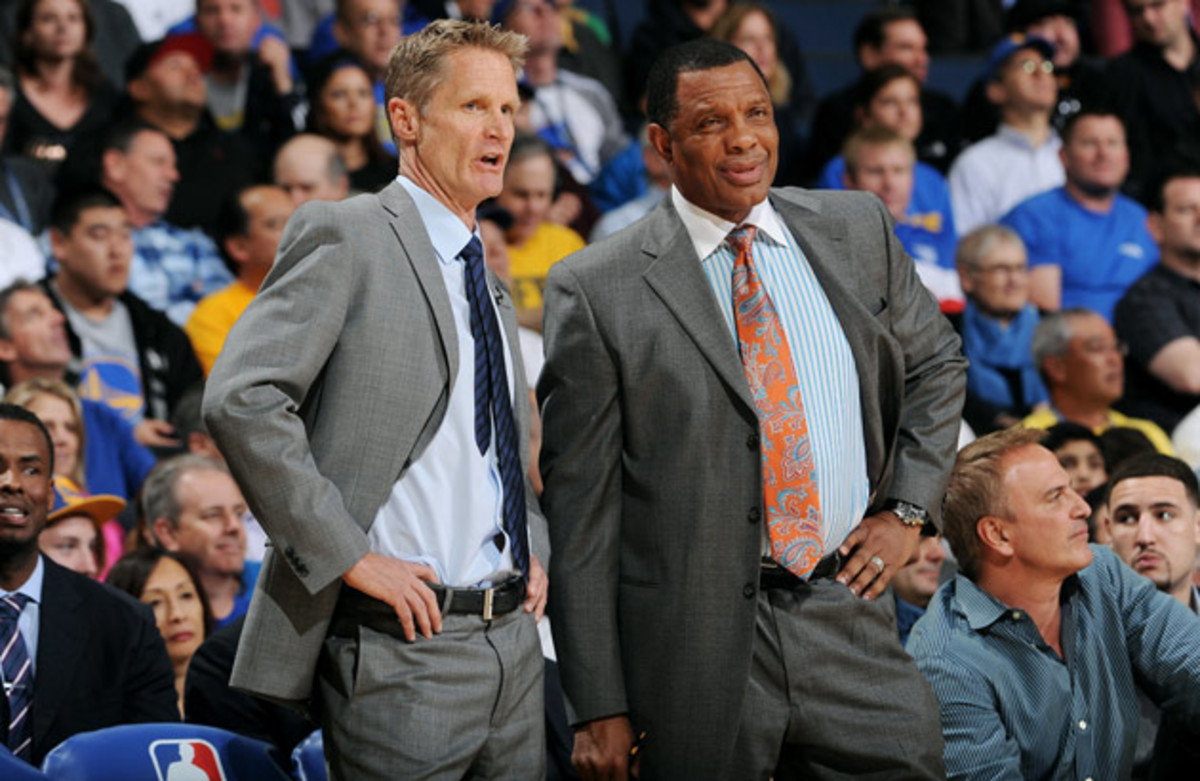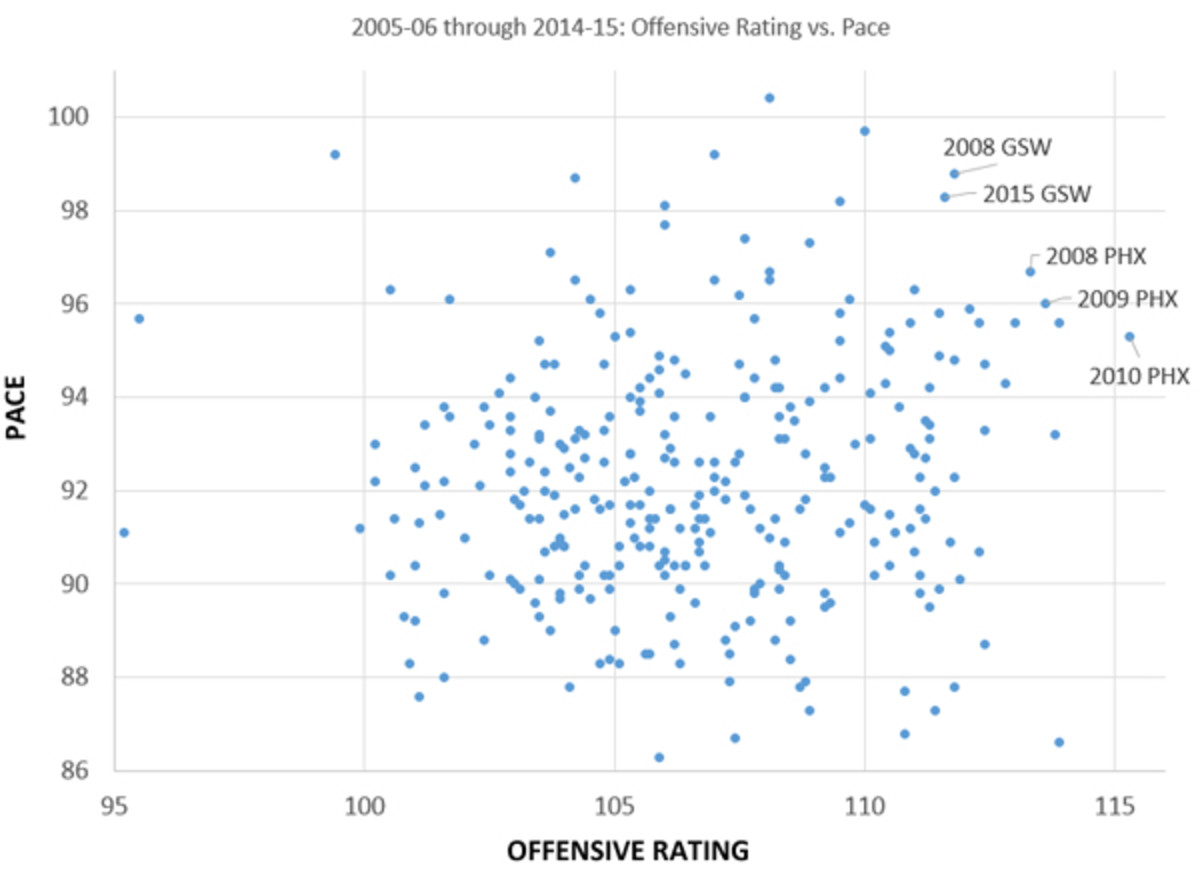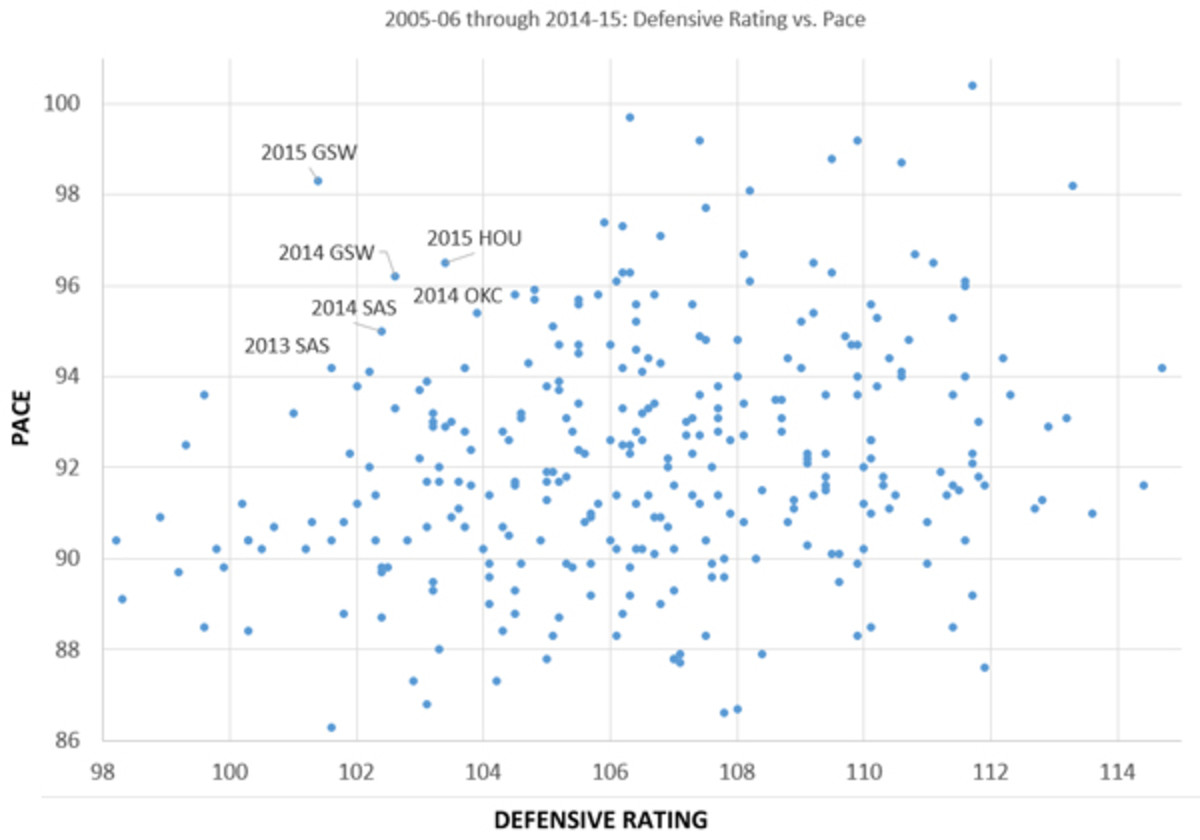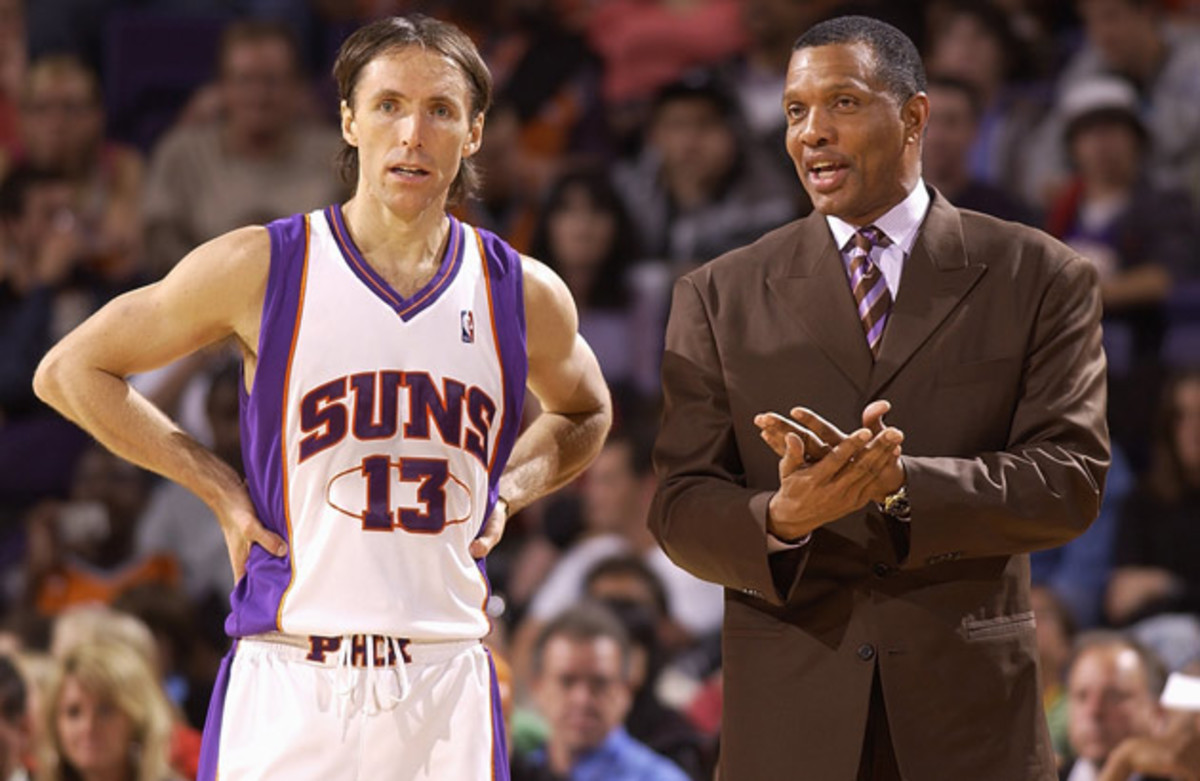Savoring every second: Alvin Gentry reflects on Warriors' diabolical run

Most coaches go their entire careers without coming across a team like the Warriors, who finished this season as one of just 10 teams in NBA history to win 67 games. Alvin Gentry knows that truth better than anyone.
Gentry, 60, has been coaching for more than half of his life, working his way up from an NCAA assistant coach in the 1980s to eventually the NBA, where he has been a head coach or an assistant for more than 25 years. The North Carolina native played for Pete Maravich's father at Appalachian State, won an NCAA title as a member of Larry Brown’s Kansas staff in 1988, worked with Gregg Popovich and Doc Rivers, served on Mike D’Antoni’s staff during the “Seven Seconds or Less” Suns era, and compiled a 335-370 (.475) head coaching record with the Heat, Pistons, Clippers and Suns, highlighted by Phoenix’s sometimes-forgotten run to the 2010 Western Conference finals.
And yet, to hear Gentry tell it last week, 2014-15 will be a season to remember and cherish, regardless of whether Stephen Curry and company can deliver the franchise’s first title since 1975. Since signing on as Steve Kerr’s associate head coach last June, tasked with overhauling an offense that under-performed the previous season, Gentry has caught himself marveling on more than one occasion.
“I’ve been in the league 25 years, and I can’t go back and say that anyone can shoot the ball off the dribble like Steph can,” Gentry told SI.com last week. There’s evident pride when Gentry describes the sacrifices made by former starters David Lee and Andre Iguodala. There’s satisfaction as he recalls seeing the instant chemistry during team dinners back in the fall. When Draymond Green’s name is mentioned, Gentry chuckles. “We’ve asked him to guard everyone from LaMarcus Aldridge and Anthony Davis, to two-guards. He’s the heart and soul.” And there’s a touch of awe as he considers Kerr’s ability to boost Golden State by 16 wins, a feat that saw the first-time head coach finish second in the Coach of the Year voting to Atlanta's Mike Budenholzer. “It’s like golf,” Gentry mused. “It’s easy to go from shooting 120 to 95. [Kerr] took a golfer who was in the high-80s and he’s got them shooting in the high-60s now. That’s really, really tough.”
• MORE NBA: Schedule | Grades | Awards | Playoff coverage | Finals picks

The best moment from this 67-win campaign? It's no surprise: Klay Thompson’s record-setting 37-point third-quarter against the Kings back in January.
“I have never seen anything like that,” Gentry said. “Really, he got 37 points in less than nine minutes because he didn’t score in the first few minutes of the quarter. It was an unbelievable, incredible roll, and I’ll always remember being there to witness that, seeing the energy in Oracle as it was happening. That feeling will stick with me forever. That’s a tough record for anyone to break—and then he comes back and scores 26 points in a quarter [against the Grizzlies in April].”
Gentry remembers Golden State’s huddles resembling a baseball dugout when a pitcher is throwing a perfect game.
“We didn’t know what to say during the timeouts,” Gentry laughed. “Do we say anything to him? Do we ignore him? Do we let it go? We didn’t know what to say after the game, either. Steve watched Michael Jordan time after time after time. For him to say that [Klay’s performance] left him speechless, it had to be unbelievable.”
Don’t mistake the marveling for satisfaction. It was Curry who set the tone by declaring recently that the Warriors were adopting a “Championship or bust” mentality for the postseason, and Gentry reinforced that notion with a belief that the Warriors’ title hopes are in their own hands.
“We respect every single team in this league, we just don’t fear anyone,” Gentry said. “We worry more about our team and the way we are performing rather than worrying about other teams. Our whole goal is to play to the top of our game, execute the way we’re supposed to, we’ll take the results of what happens from there. We [relish] the ‘favorites’ tag. We’ve earned that spot.”
Fine tuning: Coaching Stephen Curry, best shooter in the universe
The regular-season results speak for themselves. The Warriors ranked No. 1 in point differential, becoming just the eighth team in history to finish with a +10 or better. They ranked No. 2 in offensive efficiency (up from 12th last season), No. 1 in defensive efficiency (up from 3rd last season), No. 1 in pace, No. 1 in assists, No. 1 in field goal percentage, three-point percentage, effective field goal percentage and true shooting percentage, No. 1 in opponent field goal percentage and No. 1 in opponent effective field goal percentage. To no one’s great surprise, Golden State holds a 2-0 series lead over No. 8 seed New Orleans, cruising as it heads into Game 3 on Thursday at the Smoothie King Center.
The pace factor might be the most overlooked aspect of Golden State’s success. Their offense will likely be recognized with an MVP award for Curry and, possibly, an All-NBA selection for Thompson. Their defense should draw All-Defensive Team selections for Green and center Andrew Bogut, and maybe a Defensive Player of the Year award for former. But there are no end-of-season awards for pace, and for good reason. Playing fast doesn’t necessarily mean playing well. The Warriors might be a historically dominant team playing fast this year, but last year’s fastest team was the Sixers, who were so awful they tied an NBA record by losing 26 straight games.
Nevertheless, playing at the league’s fastest pace has been central to the Warriors’ success on both ends, and it's what helps sets this squad apart from just about every team that has come before them. These guys are legitimate myth-busters on both ends.
Offensively, Golden State has shown that it’s possible for a team to play super fast without getting too loose (ranking No. 13 in turnover ratio) or taking too many low-percentage shots (No. 1 in shooting rankings). Golden State’s ability to play elite offense at such a fast pace is nearly unprecedented. This chart shows the offensive rating and pace factor of every NBA team since the 2005-06 season, per Basketball-Reference.com. The only team to post a better offense/faster pace combination than this year's Warriors was the 2008 Warriors, coached by Don Nelson and led by Baron Davis, Monta Ellis and Stephen Jackson. The three other best comparison points for this year’s groups were the 2008-10 Suns, who were famously led by Steve Nash.
Note: Faster teams are at the top, slower teams are at the bottom. Better offenses are to the right, worse offenses are to the left.

Simultaneously, and perhaps most importantly, Golden State has also proven that it’s possible for a team to play super fast without making major defensive concessions, thanks in part to a deep bench that has helped limit the fatigue factor for the starters while keeping the intensity up throughout the course of a game.
Unlike the 2008 Warriors, or the "Seven Seconds or Less" Suns, these Warriors have more than gotten by defensively. This chart shows the defensive rating and pace face of every NBA team since the 2005-06 season.
Note: Faster teams are at the top, slower teams are at the bottom. Better defenses are to the left, worse defenses are to the right.

Here, the 2015 Warriors stick out as the massive outlier. Their best comparison point is actually last year’s Warriors, who weren’t quite as good defensively or quite as fast. Other recent comparison points include the 2014 title-winning Spurs, this year’s Rockets, the 2013 Spurs (made it to the Finals), and the 2014 Thunder (made it to the Western Conference finals).
The only word to describe what Kerr (who was the Suns GM from 2007-2010), Gentry, defensive guru Ron Adams (who worked for Bulls coach Tom Thibodeau), and the rest of the Warriors staff has created here is “diabolical.”
Let’s mix a bunch of similes to summarize the total impact of the Warriors’ pace:
- Golden State’s offense is like a rainstorm thanks to the Splash Brothers’ bombing and bang-bang-bang passing.
- Golden State’s defense is like a boa constrictor, squeezing the life out of its opponents with its switch-happy style and high energy.
- Golden State’s tempo is like a treadmill cranked up to its highest setting.
Each of these individual pieces can beat you. The combined effect? Imagine sprinting on a treadmill in a downpour with a boa constrictor around your neck. (Surround the treadmill/snake/rainstorm with a field of revving jet engines if you want to account for the Oracle Arena crowd.)
No wonder the Warriors seem unconcerned when observers, most notably TNT’s Charles Barkley, dismiss them as a “jump-shooting team” unfit for postseason success.
“It doesn’t matter,” Gentry said. “We’re going to play the way we’re going to play, that best suits our team. There’s been a lot of teams that have shot the ball extremely well. If you go back and look at the last five NBA champions, they were pretty good three-point shooting teams. They said that about our Phoenix teams. We played great basketball, we had a couple of 60-win seasons. To say you can’t win a championship playing a particular way, I don’t agree with that. You coach your team by utilizing the talent you have."
Warriors: From one-dimensional and one-and-done to NBA title favorites
That’s exactly what’s happening: Curry’s shooting ability—the best player’s best skill—is the team's foundation. Pushing the tempo helps him get clean looks, his ability to shoot off the bounce ensures that his looks in transition are still high-percentage shots, and the threat of his range opens up fast-break opportunities for everyone else. There’s really no such thing as “getting back” against the Warriors, not when your last defender needs to decide whether to get between the ball and the basket or to protect the three-point line. Thompson also enjoys a completely green light in these situations; Green is one of many Warriors big men who is encouraged to push the ball up the court after stops or defensive rebounds to help create favorable circumstances.
“We like to shoot quick shots in transition because we’re very capable of making them,” Gentry explained. “Those are good shots. They keep pressure on the defense. And we want to keep the defense on its heels by always staying in attack mode. That’s been our philosophy here.”
Indeed, no team attempted more shots or threes in “very early” shot clock situations (between 18 and 22 seconds remaining) than the Warriors this season. The results, which are often spectacularly entertaining, have a tendency to be back-breaking and momentum-swinging.
Hover over the following GIFs to play them.
Perhaps Curry's most memorable transition pull-up three-pointer on the break was a game-winner against the Magic back in December.
In Curry, Gentry sees a natural heir apparent to Nash. Both players “lead by example,” both “can pull anyone along with them” because of their character, both will be remembered as “all-time greats,” and both, of course, “shoot the heck out of the basketball.”
The biggest difference between the two players, as many have noted, is Curry’s willingness to shoot and ability to score in volume consistently. This year, Curry was the NBA’s sixth-leading scorer, as he averaged 23.8 points on 16.8 shots per game. Nash’s career highs were 18.8 points in 2005-06 and 13.6 shots in 2002-03. Still, Gentry is adamant that Curry puts “everyone else before himself,” a la Nash, who he calls the "most unselfish" player he has ever seen.

“If Steph only cared about scoring, I have no doubt he could lead the league in scoring,” Gentry argued. “He sat out almost 20 quarters this year, where he didn’t even get on the floor. I don’t think that’s important to him. The most important thing to him is the success of the team.”
Draymond Green, Warriors' bench fuel Game 2 win against pesky Pelicans
The possibility of that success is what convinced Gentry to leave Rivers' Clippers staff to join Kerr, who leaned on their shared history from Phoenix during his recruitment. “I saw this team had the potential to do a lot of really good things,” Gentry said. “I don’t think there was any other situation I would have left LA for, except to work for Steve.” It's worth noting that the Clippers and Warriors, who faced off in the first round last year, could be headed for a rematch in the Western Conference finals.
When Golden State’s ride ends, whether it’s with champagne or chagrin, Gentry may very well find himself facing a decision. ESPN.com and Yahoo Sports reported earlier this month that he is expected to be a candidate for the Nuggets’ open head coaching position, with other jobs potentially opening up after the postseason. Rivers and Kerr both suggested last month that Gentry could soon be coaching his own team again.
“Obviously I would like to be a head coach again, but only if it’s a good situation,” Gentry said. “I have no desire to be a head coach just to be a head coach. I want it to be with a good franchise that will have a chance to grow and a chance to win. I’m flattered that my name would even be out there. I’m in a great situation, I’ve got a great job. I work with great people. That’s from ownership down to the last coach on our staff, and the players are tremendous. I’m very content where I am.”
That’s the plan after all these years. Savor every second.
